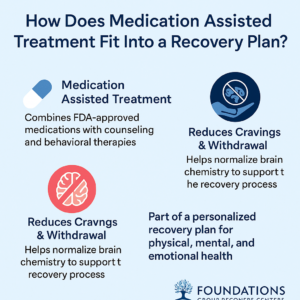When you’re trying to get back on track, even picking up the phone can feel too big. You want help, but the idea of starting from scratch—again—feels like too much. That’s where Medication Assisted Treatment (MAT) comes in. It’s not about replacing one thing with another. It’s about making recovery feel doable again, especially if you’ve hit a wall.
Let’s break down how MAT can support your next step in recovery—without shame, pressure, or pretending it’s easy.
What Is Medication Assisted Treatment?
Medication Assisted Treatment, or MAT, combines FDA-approved medications with counseling and behavioral therapies to treat substance use disorders. It’s most commonly used for opioid and alcohol dependence but can be applied to other substances under clinical guidance.
MAT helps normalize brain chemistry, block the euphoric effects of substances, relieve cravings, and stabilize body functions without creating a new addiction. It works by supporting your system while you do the emotional and psychological work of recovery.
At Foundations Group Recovery Center in Massachusetts, MAT is integrated into a full care plan that treats the whole person, not just the symptoms of addiction.
MAT Isn’t a Shortcut—It’s a Safety Net
There’s a myth that MAT is “just replacing one drug with another.” But that couldn’t be further from the truth. The medications used in MAT are not substitutes for getting high. They are carefully regulated, prescribed in specific doses, and designed to reduce the chaos in your system so you can think clearly and make real progress.
Imagine trying to learn to swim while fighting off a panic attack. That’s what early recovery can feel like without support. MAT helps lower the volume on the survival instinct so you can focus on healing.
It doesn’t do the work for you—it makes the work possible.
Personalized Support, Not One-Size-Fits-All
No two people enter recovery in the same place, so no two MAT plans should be the same. At Foundations Group, we offer a range of medications depending on the substance involved, your medical history, and your goals.
Options may include:
- Buprenorphine (e.g., Suboxone): Reduces cravings and withdrawal without producing a high.
- Naltrexone: Blocks the effects of opioids or alcohol.
- Methadone: Used in certain cases under close supervision.
Our team works with you to decide what makes sense for your life and your recovery plan. This isn’t about fitting into a program. It’s about the program fitting into you.
MAT and Therapy: Stronger Together
Medication can help rebalance brain chemistry, but it can’t rebuild trust, reframe trauma, or develop coping skills. That’s where therapy comes in.
MAT is most effective when it’s combined with evidence-based therapies like:
- Cognitive Behavioral Therapy (CBT)
- Dialectical Behavior Therapy (DBT)
- Group and peer support
- Family therapy
At Foundations, we integrate MAT into a recovery plan that supports your emotional, mental, and physical well-being. You’re not just getting a prescription. You’re getting a team that sees the whole picture.
Starting Again Doesn’t Mean Starting Over
If you’ve left treatment before or ghosted a program, you might feel like you blew your chance. But that’s not how recovery works. Healing isn’t linear. Sometimes you need to pause. Sometimes you need to come back with more support.
MAT can be that bridge. It’s especially helpful if the idea of jumping back into a full schedule feels overwhelming. With MAT, you can stabilize first, then slowly layer on support at a pace that works for you.
We don’t ask, “Why did you leave?” We ask, “How can we help you come back?”
How to Get Started with MAT in Massachusetts
If you live in Massachusetts and are considering MAT, here’s what the process looks like at Foundations Group Recovery Center:
- Confidential Assessment – A clinician talks with you about your history, current needs, and goals.
- Medical Evaluation – We assess your physical health to determine the safest and most effective medication.
- Integrated Plan – We develop a recovery plan that includes therapy, peer support, and medication.
- Ongoing Support – You’ll have regular check-ins with your care team to adjust your plan as needed.
You don’t have to know exactly what you need. You just have to be willing to ask.
Frequently Asked Questions
Is MAT just for opioid addiction?
No. While it’s most commonly associated with opioid use disorder, MAT is also used to treat alcohol dependence and, in some cases, other substances under clinical guidance.
Will I be on medication forever?
Not necessarily. MAT is flexible. Some people use it short-term to stabilize, others longer-term as part of their ongoing recovery. You and your provider decide what’s right for you.
Is it safe to combine MAT with therapy?
Absolutely. In fact, therapy is a critical part of the MAT model. The combination of medication and counseling is what makes MAT so effective.
What if I tried MAT before and it didn’t work?
That doesn’t mean it can’t help now. Sometimes the medication needs to be adjusted, or the support system needs to be stronger. We can work with you to make it a better fit.
How do I know if MAT is right for me?
Start by having a conversation. Our team can help you understand your options and make an informed choice.
Ready to Talk It Through?
You don’t have to decide everything today. But if you’re even thinking about trying again, that’s enough. Our team at Foundations Group Recovery Center is here to walk you through what Medication Assisted Treatment could look like for you—at your pace, on your terms.
📞 Call us at (844)763-4966 to learn more about MAT in Massachusetts. You’re not too far gone. You’re not behind. You’re still in this.


